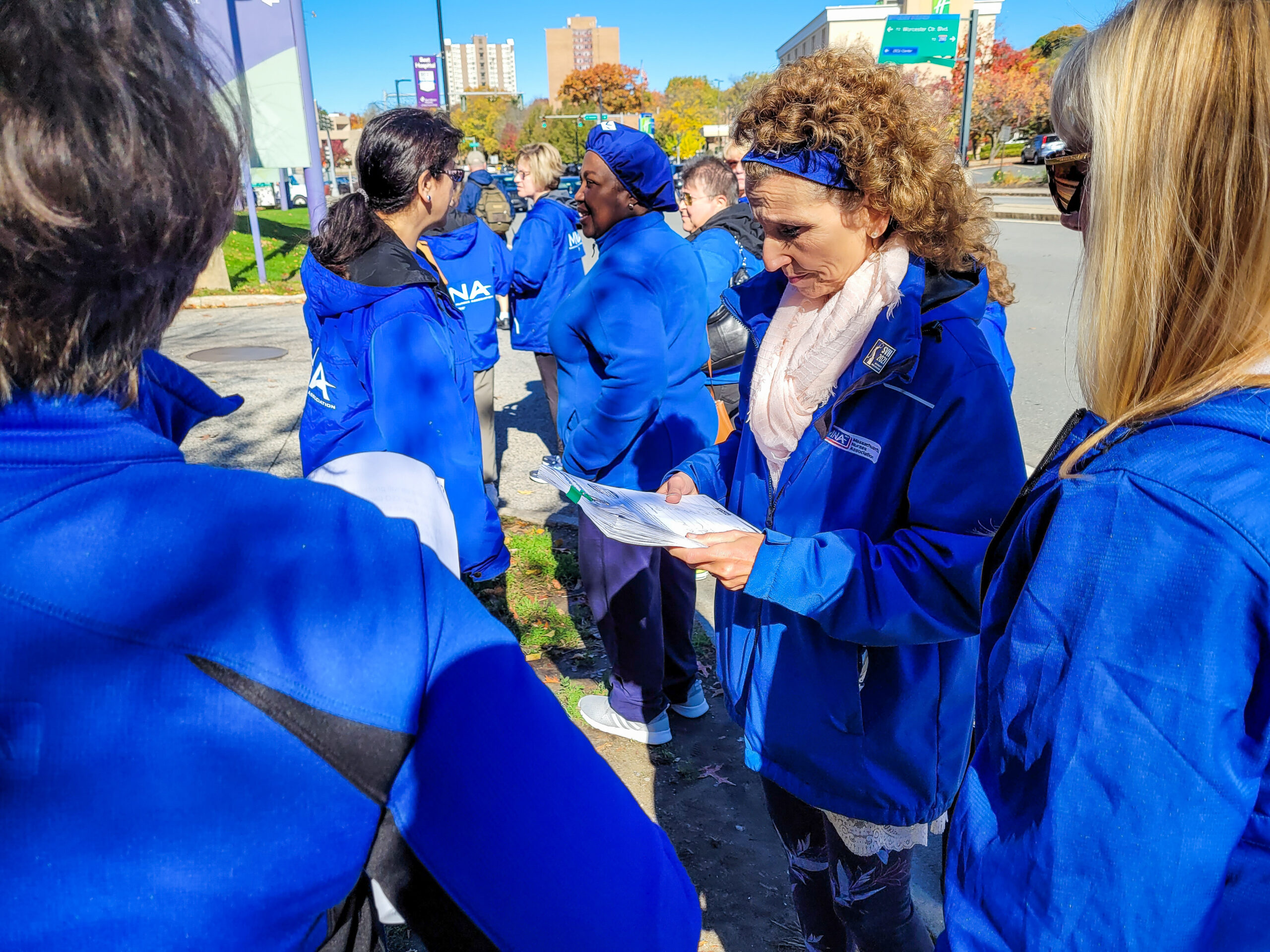WORCESTER, MA — At an afternoon press conference on Thursday, a group of St. Vincent Hospital nurses gathered on Summer Street in Worcester and detailed serious deficiencies in patient care and safety that have contributed to an exodus of over 100 nurses and staff, dangerous delays in care, and other harm to patients.
Their concerns include a lack of needed staff and supplies, operations concluding with incorrect sponge and instrument counts, with these items possibly left inside patients, and at least three “never events” — in this case, a wrong-site surgery and two wrong-site procedures — serious medical errors that should never happen.
After the press conference, nine nurses entered the hospital to present a petition signed by close to 80% of the over 600 members of the nurses’ bargaining unit, as well as physicians and other staff, opposing what nurses described as “callous” plans by the administration to eliminate St. Vincent’s specially trained, 24/7 intravenous (IV) therapy team.
In a release from the Massachusetts Nurses Association (MNA), Deb Berberian, a 30-year veteran of the IV team, and Karen Soper, a 26-year nurse on one of the cardiac telemetry floors, both emphasized the importance of having dedicated staff to perform this important work.
“With our skill and experience, we can insert a line in minutes, without multiple sticks, which may take nurses, even experienced nurses much longer,” Berberian said. “Our expert support frees them up to focus on other aspects of patient care.”
“The working conditions make me afraid for my patients and my license.”
Karen Soper, RN
Soper, who has resigned in response to “the deliberate downsizing of critical team members like secretaries and respiratory therapists and most recently the plan to eliminate our IV team,” said, “the working conditions make me afraid for my patients and my license.”
Marlena Pellegrino, a co-chair of the bargaining unit, told Working Mass about the impact the planned elimination of the IV team will have on other already overburdened nurses and the quality of care, saying that “when you’re at a point where you can’t bathe patients, feed patients, keep patients safe, give medication on time, provide comfort to patients, teach patients, discharge patients properly, admit patients properly, you’re at a very low level of care. And now they want to add this on.”
The MNA reports that the hospital’s Chief Nursing Officer Jay Prosser refused to respond to an earlier letter from Pellegrino and fellow co-chair Dominique Muldoon making a nurse-to-nurse appeal for a meeting to discuss their concerns. The nurses say it was the moves by the hospital to eliminate the IV team that ultimately precipitated their decision to go public about a wider range of “rapidly deteriorating patient care conditions” that have resulted from “an unrelenting and illegal attack on nurses and their patients by the hospital administration.”
Since they ratified a new contract in January ending their 301-day strike, the St. Vincent nurses have filed more than 100 grievances for “egregious contract violations” of required staffing levels, a unilateral hospital-wide change from 8-hour to 12-hour shifts, and discrimination and retaliation against union nurses.
The nurses have also filed 13 charges with the National Labor Relations Board encompassing 29 counts of unfair labor practices by Tenet Healthcare, the Dallas-based for-profit corporation that owns the hospital. These include targeting MNA leadership for discipline, failing to provide the information needed to process grievances, failing to provide access to hospital property to conduct legally protected union activity, and refusing to return some striking nurses pursuant to the contract.
For the first six months after the contract was ratified, the terms of the agreement prevented nurses from speaking out publicly about the issues they are now raising.
Now, while having pursued and continuing to pursue legal and contractual remedies, the nurses say they feel compelled to take their concerns directly to the public.
Speaking after they attempted to deliver the petition, Pellegrino said to Working Mass, “As a union, you stick together, and you strategize, and you try to get the best outcome for your patients. You never know what the outcome will be, but… you know what the outcome will be if you don’t stand up.”
“There’s a comfort in knowing that we all know what the right thing is to do. It’s hard to do it. It’s not easy or pretty or smooth, but at the end of the day, you have to lay your head on the pillow and know you did the right thing,” she said. “So if what we have to do is stand out on the sidewalk, we’ve proven we did it before for our patients, and we’ll do it again.”
“They brought today on themselves,” another nurse remarked. “It’s all a big game to them.”
Or as one retired nurse put it to Working Mass, “We’ve got to do something — they’ve maimed enough people.”
Cory B is a member of the Steering Committee of Worcester DSA, a correspondent for Working Mass, and a member of the Massachusetts DSA Labor Committee and DSA’s National Labor Commission.
Featured image credit: Marlena Pellegrino takes a moment to look down and contemplate the petition in her hands as a group of nurses prepare to walk into St. Vincent Hospital to present their concerns about patient care and safety on October 27, 2022. Cory B/Working Mass

